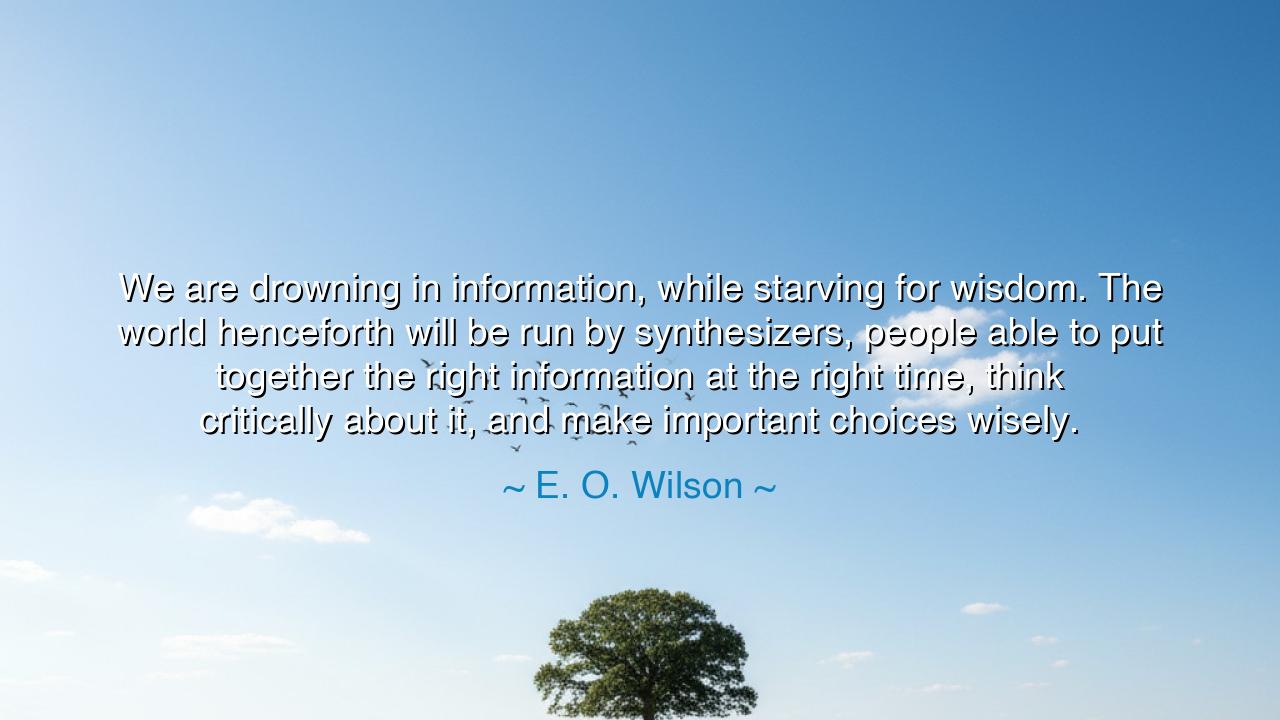
We are drowning in information, while starving for wisdom. The
We are drowning in information, while starving for wisdom. The world henceforth will be run by synthesizers, people able to put together the right information at the right time, think critically about it, and make important choices wisely.






The voice of the naturalist and thinker E. O. Wilson pierces through the noise of our age when he declares: “We are drowning in information, while starving for wisdom. The world henceforth will be run by synthesizers, people able to put together the right information at the right time, think critically about it, and make important choices wisely.” These words are not mere reflection, but prophecy. For Wilson, a man who studied both the tiniest of creatures and the grandest of human dilemmas, saw that abundance can be as perilous as scarcity. When knowledge multiplies without measure, the soul risks being crushed under its weight, unless wisdom arises to guide it.
The origin of this quote lies in the latter half of the 20th century, as the flood of data began to overtake the human mind. Wilson, a biologist, lived in the dawn of the information age. He witnessed libraries expanding, computers awakening, and streams of knowledge flowing faster than any one mind could comprehend. Yet he saw also the danger: that men and women might confuse information with understanding, mistaking the possession of facts for the possession of truth. Just as the ancients warned that learning without wisdom breeds arrogance, so Wilson warned that the new rulers of the earth would not be those who simply know much, but those who can discern what truly matters.
The ancients themselves foresaw this peril. The philosopher Socrates said that the unexamined life is not worth living, for knowledge without reflection is like food without digestion—it nourishes nothing. The scribes of Babylon once inscribed endless tablets, yet it was the wise who interpreted the stars and guided the king. Likewise, the scholars of Alexandria held scrolls beyond number, yet still hungered for the philosopher’s insight. Thus, across the centuries, mankind has learned that information alone cannot save us—only wisdom can.
Consider the tale of the Cuban Missile Crisis, when the world teetered on the edge of destruction. There was no lack of information—intelligence reports, maps, and photographs flowed into the hands of Kennedy and his council. Yet information alone could not decide the fate of nations. What saved the world from nuclear fire was synthesis and wisdom—the ability to weigh facts, discern motives, predict consequences, and choose with patience rather than panic. Here, Wilson’s prophecy was fulfilled: survival did not belong to the most informed, but to the most wise.
The lesson is this: we live in an age where voices clamor from every screen, where facts are as countless as the sands of the shore. To drink deeply from this ocean without discernment is to choke and drown. But the one who learns to filter, to weigh, to judge with clarity—that one becomes a synthesizer, a leader, a builder of futures. Such people will inherit the power to steer societies, not because they hold more data, but because they forge meaning from the chaos.
Therefore, let us take heed. Do not boast in how much you know, but in how well you discern. Do not chase every fragment of news, but learn to ask: “What is essential? What leads to truth? What serves justice and life?” Train your mind not merely to collect, but to connect, to see patterns, to weigh choices, to act with prudence. For in this lies true mastery—not over knowledge, but over life itself.
In practice, cultivate the habit of reflection. Each day, sift through the noise and choose one truth to carry with you. Read not only widely but deeply, pausing to ask what it means for your path. When faced with choices, gather information, but do not be enslaved to it; lift your eyes to wisdom, and let it guide your steps. In doing so, you will not drown in information, but rise above it, walking upon its waves as one who has found balance.
Thus, remember the eternal teaching of E. O. Wilson: the world belongs not to those who hoard knowledge, but to those who forge wisdom. In an age of abundance, become not a collector of fragments, but a weaver of truth. For in the end, the crown is given not to the most informed, but to the most wise.






AAdministratorAdministrator
Welcome, honored guests. Please leave a comment, we will respond soon